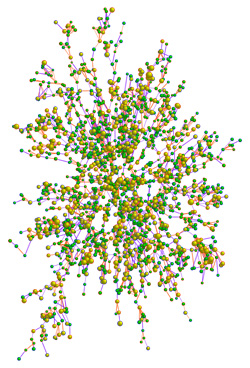The two men started publishing their findings with a splash: a 2007 article in the New England Journal of Medicine reporting that obesity spreads through social networks, as people are apparently influenced by friends’ weight gain to become obese themselves. More perplexing is their finding that obesity spreads through up to three degrees of separation. If a subject named a friend who was also in the study, and that friend’s friend became obese, the first subject’s chances of becoming obese were roughly 20 percent greater. Across one more degree of influence (husband’s friend’s friend or friend’s sibling’s friend—i.e., three degrees away), the risk was 10 percent greater. Weight gain appears to ripple through friend groups via some unseen mechanism such as altered eating or exercise behavior, or adjustment of social norms regarding weight.We are our brother’s keeper, and our brothers, sisters, aunts, uncles, parents, children, friends, colleagues, and neighbors are our keepers.The authors found similar patterns for happiness, loneliness, depression, alcohol consumption, the decision to stop smoking, and even divorce. “Our health depends on more than our own biology or even our own choices and actions,” they write in Connected. “Our health also depends quite literally on the biology, choices, and actions of those around us.”
Short Link:

What I’d like to see is if the opposite is true. If you have healthy body weight friends, does that make you more likely to be a healthy body weight?
The authors seem to take that as a corrolary of their evidence.
They’re working on how best to accomplish spreading healthy signals:
“But when it comes to diet and exercise, is it better to have people with more connections float the healthy recipes and exercise messages, or to have the positive signals come from close friends of the target? That puzzle has not been solved, even though efficient public-health spending depends on the answers to such questions.”